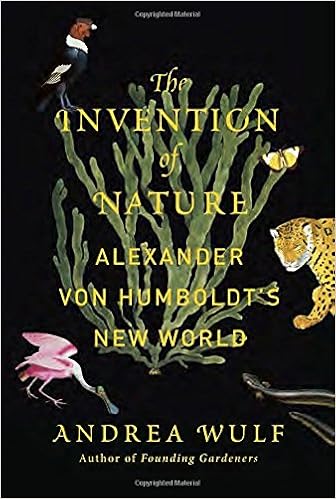The Invention of Nature: Alexander von Humboldt's New World is Andrea Wulf's introduction of the most important scientist that most people have never heard of. Born in eighteenth century Prussia, von Humboldt from an early age became fascinated with the natural world. That wasn't a terribly uncommon pastime in those days, when many people took an interest in nature. What made Humboldt unique was that his interest went beyond collecting and documenting natural curios, like shells and beetles and birds. He had a genius for seeing the interconnectedness of the natural world, how plants and animals and people and geology and climate itself interplayed with one another.
Years before anyone had even invented the word "Ecology", Humboldt had the idea in his mind.
Traveling from Germany to South America, Humboldt's explorations took him from the marshlands of the Orinoco (where he experimented with electric eels) to the peaks of the Andes, atop the volcano that was, at the time, believed to be the tallest mountain in the world. Along the way, he mapped new territories, discovered new species, and recorded local customs and traditions... which is what plenty of other explorers did. What he also saw and recorded, however, was how humans had changed the environment. Deforestation, over-exploitation of the soil, and poorly thought out irrigation schemes turned what had once been abundant habitat for countless species into baked desert, displacing the wildlife and impoverishing the people. Rather than learn from these mistakes, however, colonial authorities seemed intent on making them over and over again.
He was also renown his time as a writer as well as a scientist. His poetic descriptions and simple explanations of the natural world made the sciences accessible to audiences around the world.
Upon returning from Latin America (via the United States, where he become friends with President Thomas Jefferson), Humboldt only traveled outside of Europe once more, on an expedition to Central and East Asia. It's likely that his most important scientific works, however, were carried out back in Europe, in Paris (which he adored) and in Berlin (less so). While many scientists (also a word not in use back then) hoarded their research and jealously guarded their work until it was ready to publish, Humboldt set himself up as a patron of scientists near and far. He made introductions for them, guided their researches, proof-read their work, and loaned them money which he frequently didn't have to further their research.
Surprisingly for a biography, there are several chapters where Humboldt doesn't appear at all - at least directly. Those chapters devotes to a host of scientists from around the world - some of whom never met Humboldt at all - who were influenced directly by his work to change the course of science. Their numbers include Henry David Thoreau, John Muir, and Charles Darwin. One thing Humboldt never did get around to in a long, busy life was getting married or having a family. His legacy, however, lives on in the hundreds of scientists that he inspired, many of whom went on to change the world in ways great and small.
What baffled me the most as I finished the biography was - how have I not heard of this guy before? I mean, besides in the very vague sense (i.e., penguins). The answer comes towards the end. Decades after Humboldt's death, the outbreak of World War I caused a rash of anti-German sentiment to sweep the United States. Acknowledging that the most respected scientist of the age was a German rubbed jingoist sentiments the wrong way, and Humboldt was neatly scrubbed from history, with street names being changed to erase his memory.
American schoolchildren don't study Humboldt in classes, and, while his legacy is scattered around the globe in various place names and species names, his name is not a household one. His greatest legacy to our civilization hasn't been the addition of a few new species to the taxonomic roll call, or the pretty poetry of his scientific texts, has been an understanding that humans aren't above nature - they are a part of nature, and capable of having an outsized impact on the rest of it. And that was BEFORE the Industrial Revolution and the accelerated burning of fossil fuels.
It's unfortunate that, 200 years after Humboldt's first words of warning, we're still having to convince people that humans have the power to destroy the planet... and an obligation to save it.

No comments:
Post a Comment